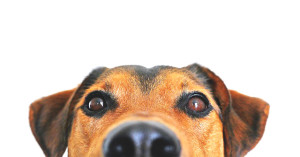 This article discusses many different potty issues that can arise in puppies and adult dogs and how you can stop your dog from pooping and peeing in the house.
This article discusses many different potty issues that can arise in puppies and adult dogs and how you can stop your dog from pooping and peeing in the house.
When house training has failed or suddenly stops working, there are 3 main causes to your dog’s behavior:
- A medical reason brought on by an inner physical complication.
- A behavioral reason brought on by new outside influences.
- An ongoing fear or compulsion brought on by associations..
Although it is common for a dog to seemingly be unable to be house trained at all, let’s first discuss when a previously house trained and well behaved adult dog suddenly starts peeing or pooping in the house. When this happens, there is most likely a single underlying problem that needs to be addressed. But the question is “How do I find out what the source of the problem is?”. The first and most important factor you want to explore is a possible medical issue.
Medical Problems That Can Cause Your Dog to Pee or Poop Indoors
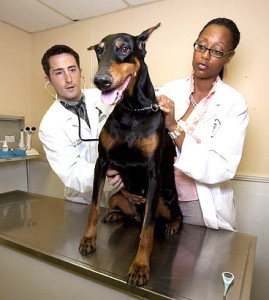 If an adult house trained dog suddenly starts having frequent accidents in your home, a medical issue may be the cause fo the problem.
If an adult house trained dog suddenly starts having frequent accidents in your home, a medical issue may be the cause fo the problem.
Accidental defecation may be due to the ingestion of spoiled food or a parasitic item found outside. Your dog may need medication from your veterinarian that will kill off the parasites that were ingested.
Sudden accidental urination is quite possibly due to a urinary tract infection (UTI). If this is the culprit, not only will unwanted puddles be seen, but little dribbles as well. Like a UTI in humans, dogs will feel a constant urge to relieve themselves even if very little comes out due to an infection in the bladder. UTI’s are quite common and medication should be readily available from your vet.
Senior dogs often develop behavioral and physical issues that typically lead to bathroom issues. Elderly dogs can develop a canine cognitive disorder, similar to human Alzheimer’s disease, where they may forget the correct places to go to the bathroom or not be fully aware of where they are when they have the urge to go. Another common issue that comes with aging is arthritis, which can cause intense pain in their joints making the dog unable or unwilling to walk outside to relieve themselves.
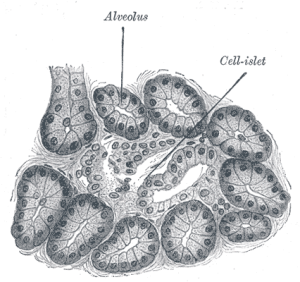 Other Common Medical Causing Sudden Frequent Peeing in the House:
Other Common Medical Causing Sudden Frequent Peeing in the House:
- Bladder stones
- Kidney disease
- Cushing’s disease
- Diabetes
- Bladder or urethral tumors
- Prostatic disease in intact male dogs
- Pyometra infection in intact female dogs
- Vaginitis in intact female puppies
- Estrogen Incontinence
- Side effects of new medications
If your house trained dog begins to poop or pee in your home, it is very important that the first thing you do is head to your vet to rule out any medical problems your dog may have.
After your vet has run thorough tests on your pup and no irregularities are found, the next step is to look into what circumstances have changed in your living environment since your dog began tinkling in the house.
Common Lifestyle Changes to Cause Dog to Suddenly Begin Urinating in Home
#1 Rule: Never Punish
Although it may seem like your dog is mad or trying to punish you as the owner for making a change, this is far from the case. Your dog is full of anxiety and confusion at the moment and needs your help to understand whats going on. Never punish your dog for the inappropriate urination. Don’t rub your dog’s nose in it or shout or even worse hit your dog. You will only make matters worse. Punishing yout dog will only show them that your dog will learn that people are unsafe and unpredictable. You need to find the reason why your dog is doing this and then address the issue by correctly managing their environment.
Although it may seem like your dog is mad or trying to punish you as the owner for making a change, this is far from the case. Your dog is full of anxiety and confusion at the moment and needs your help to understand whats going on. Never punish your dog for the inappropriate urination. Don’t rub your dog’s nose in it or shout or even worse hit your dog. You will only make matters worse. Punishing your dog will only show them that your dog will learn that people are unsafe and unpredictable. You need to find the reason why your dog is doing this and then address the issue by correctly managing their environment.
Top 5 Lifestyle Changes that Affects your Dog’s Behavior
- Adding a new pet or person to the household.
- Death in the family or someone going away
- Construction work going on in the home
- Change in the owner’s household routines due to new job/schedule
- New Home
What to do if Dog is Peeing in New Home?
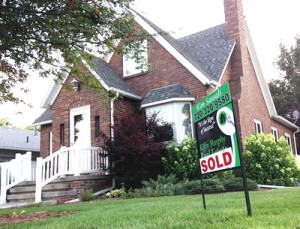 If you have just moved to a new home or apartment, there is a good chance that your dog may have a few accidents in the house in the beginning. This is most likely due your dog’s lack of knowledge of the “new routine”. Dogs do not learn a routine according to the time of day like humans do. Dogs depend heavily on human’s actions to know when they will be fed and be let out for some relief. Since a move is such a big change, it is almost like your dog has to learn a whole new routine all over again. Luckily if your dog was already house trained in your last house, it shoudl not take that long to acclamate them to the new schedule.
If you have just moved to a new home or apartment, there is a good chance that your dog may have a few accidents in the house in the beginning. This is most likely due your dog’s lack of knowledge of the “new routine”. Dogs do not learn a routine according to the time of day like humans do. Dogs depend heavily on human’s actions to know when they will be fed and be let out for some relief. Since a move is such a big change, it is almost like your dog has to learn a whole new routine all over again. Luckily if your dog was already house trained in your last house, it shoudl not take that long to acclamate them to the new schedule.
I cannot stress enough routine! if you are going to try one method, important thing is repetition.
Here are some things to focus on to help your dog settle in:
- Keep your dog on a consistent daily feeding schedule and remove food between meals.
- Take your dog outside on a consistent and frequent schedule. Try to associate bathroom breaks with certain events in the day such as first thing that happens when you get out of bed, last thing that happens right before bedtime, when you run the dishwasher or do laundry (if its around same time every day). Fully house-trained adult dogs should have the chance to eliminate outside at least four times a day.
- Try to keep an eye on your dog at all times while you are home. Try to look for signs that he or she needs to eliminate such as pacing, whining, circling, sniffing, sitting/scratching/barking at door. If you see any of these, take your dog outside as quickly as possible. Better safe than sorry.
- If you catch your dog in the act of urinating inside the house, try make a loud short noise to startle them such as a clap. The scare should stop your dog midstream and gives you the chance to lead or carry your dog outside to finish
What to do if Dog is Peeing in House due to New Person or Pet?
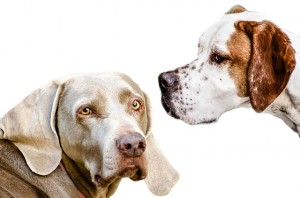 If your dog begins to poop or pee in the house as soon as a new person (such as a baby) or newly adopted pet is brought into the house, most likely the issue is stemming from jealousy, lack of attention, and lowered self esteem. Your dog may be feeling ignored or at least fear being ignored. You may need to give more attention than usual for a limited period of time. Make sure you give your dog lots of praise, treats, playtime, walks, and even some fun car rides.
If your dog begins to poop or pee in the house as soon as a new person (such as a baby) or newly adopted pet is brought into the house, most likely the issue is stemming from jealousy, lack of attention, and lowered self esteem. Your dog may be feeling ignored or at least fear being ignored. You may need to give more attention than usual for a limited period of time. Make sure you give your dog lots of praise, treats, playtime, walks, and even some fun car rides.
If it is a new pet that is the issue, make sure you monitor all their interactions. Try to pet both dogs at the same time and then switch hands so that their scents are being rubbed on one another.
Note that a neutured or spayeed dog will have less of an urge to ‘mark their territory’.
Common ongoing behavioral problems that prevent your dog from being house trained
What to Do if Your Dog Pees When Excited or Anxious
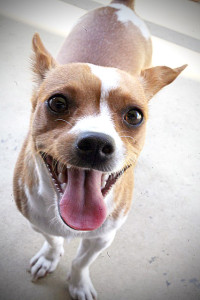 Unintentional urination often happens in small dogs and puppies when they are anxious. They can get very excited and suddenly pee when greeting a human entering the home. Other times some leakage can happen when playing or receiving a belly rub. Often times this can be due to the dog having a more shy and submissive personality. Although he or she may be enjoying the belly rub, the idea of a very tall human bending over to touch them can still make them a little nervous.
Unintentional urination often happens in small dogs and puppies when they are anxious. They can get very excited and suddenly pee when greeting a human entering the home. Other times some leakage can happen when playing or receiving a belly rub. Often times this can be due to the dog having a more shy and submissive personality. Although he or she may be enjoying the belly rub, the idea of a very tall human bending over to touch them can still make them a little nervous.
So how can we address this problem? If it is a puppy exhibiting these behaviors, many times the issue will resolve itself on its own as the puppy mature. If it is an adult dog, there are a few techniques you can use. When entering the home, avoid giving instant attention. Ignore your dog for up to 5 minutes or until the dog relaxes before interaction. You can also try training the dog to sit when you enter your home. It is important for everyone who enters the house to follow the same behavior. As for the peeing while playing, try getting to the ground first by kneeling or sitting instead of bending over to pet. You can also try to act a bit submissive and let your dog come to you in order to gain a bit more confidence.
What to do if your Dog Pees In House due to Separation Anxiety?
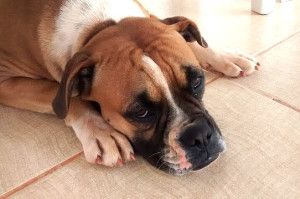 Separation anxiety is one of the most common examples that leads to inappropriate urination. This is when the dog only urinates or defecates when the owner leaves the home. This is due to the rise of the dog’s anxiety level.
Separation anxiety is one of the most common examples that leads to inappropriate urination. This is when the dog only urinates or defecates when the owner leaves the home. This is due to the rise of the dog’s anxiety level.
Although crating your dog while you’re out is usually the first thing most people think of, it is not for everyone. Crating can actually just cause even more stress and anxiety. Do not crate especially if your dog tends to soil it while in one. This will just reinforce an unwanted habit of soiling their sleeping area. A better method would just to simply limit the space the dog is in while you are out. Make your dog feel as safe and comfortable as possible – give them lots of toys, bedding, puzzle games, and play some relaxing music. You may want to consider adopting a second dog to keep them company while you are out.
What to do if your Dog Is Afraid to Go Outdoors to go Potty?
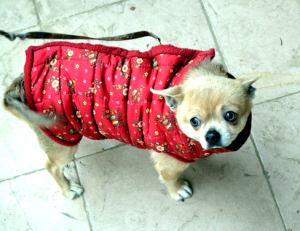 Your dog may be anxious about going outside for several reasons. This can be due to rain snow, distant thunderstorms, fireworks, neighbor dogs barking, outdoor construction, or even just the sound from cars driving by. If the outdoor noise is temporary, such as a nearby construction project, consider taking your dog somewhere else, like a doggy day care, or perhaps drive them to a different street to take a walk. You can also try playing calming music while outside and provide them with treats and toys in attempt to make the outdoors a more fun environment. For things like rain or snow, you make want to put a doggie coat on them or follow them around with an umbrella to provide a feeling of protection while they go. Let your dog take its time as some like to explore first before choosing a spot.
Your dog may be anxious about going outside for several reasons. This can be due to rain snow, distant thunderstorms, fireworks, neighbor dogs barking, outdoor construction, or even just the sound from cars driving by. If the outdoor noise is temporary, such as a nearby construction project, consider taking your dog somewhere else, like a doggy day care, or perhaps drive them to a different street to take a walk. You can also try playing calming music while outside and provide them with treats and toys in attempt to make the outdoors a more fun environment. For things like rain or snow, you make want to put a doggie coat on them or follow them around with an umbrella to provide a feeling of protection while they go. Let your dog take its time as some like to explore first before choosing a spot.
To further encourage your dog to urinate outside, wait until they have done ‘the deed’ then welcome them back in the house with some treats and playtime.
If your dog is still having accidents in the house after trying several of these techniques or perhaps you do not have the time needed to train your dog, you may want to consider a doggie day care or a professional dog walker. Not only will these services guarantee that your dog will be let out while you are away, it is also good for their mental health as they are socializing with others on a daily basis.
See helpful article “12 Quick & Easy Tricks if Your Dog Poops or Pees Indoors”

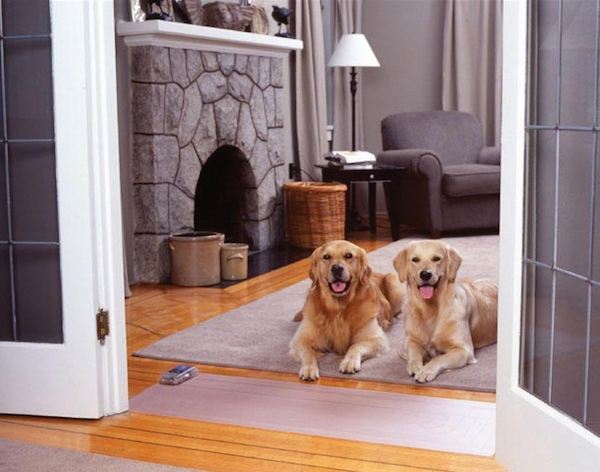 Booby traps that will restrict pets from areas in your home
Booby traps that will restrict pets from areas in your home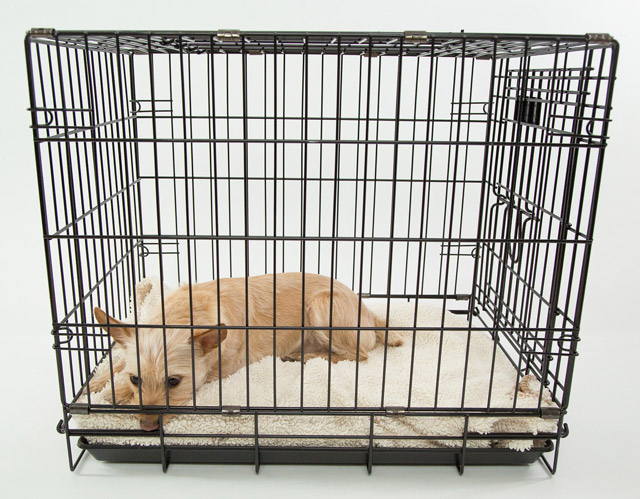 To crate train or not to crate train
To crate train or not to crate train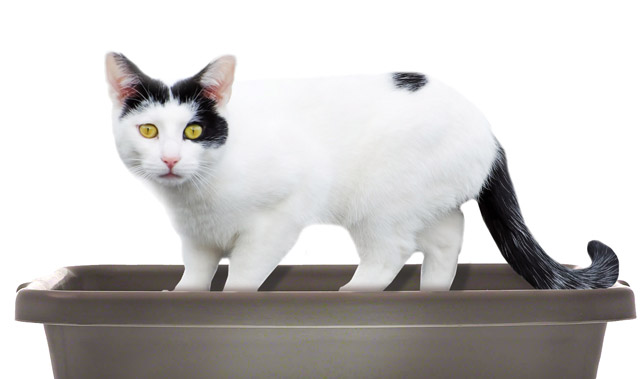 Why cats pee outside the litter box – Medical vs. Behavioral
Why cats pee outside the litter box – Medical vs. Behavioral